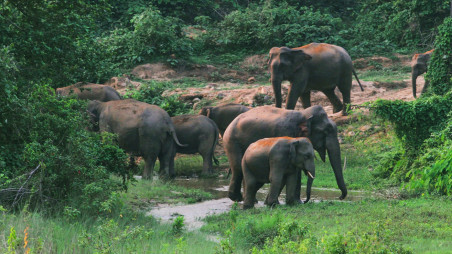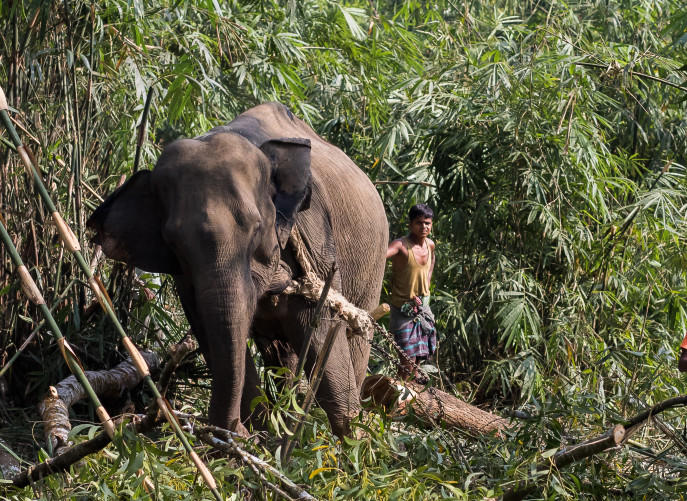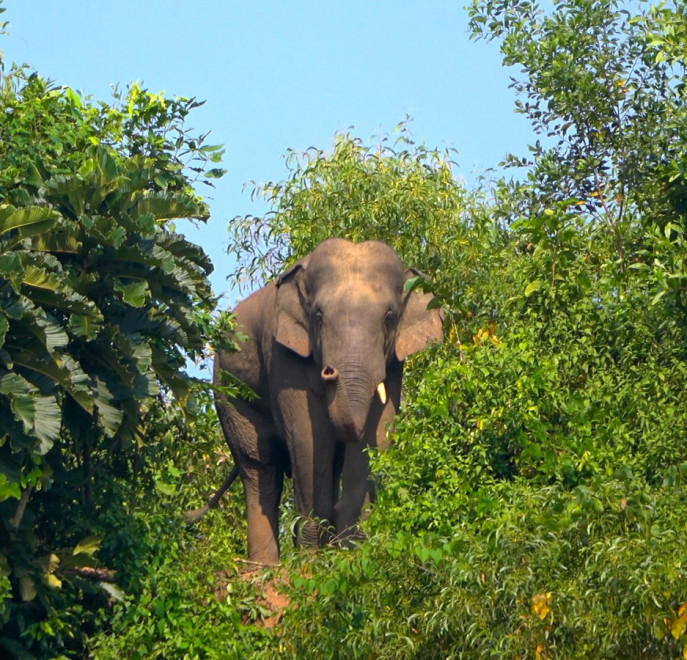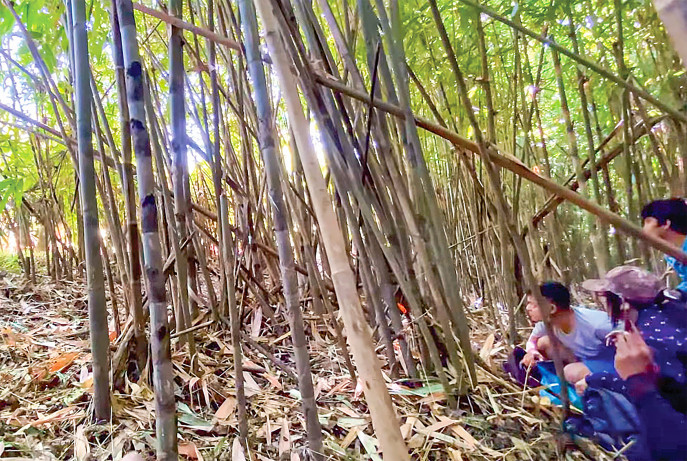A ‘scary elephant encounter’: What it says about trekking through wildlife sanctuaries

As hiking and trekking in Bangladesh’s hilly areas grow popular among local tourists, many walk into the territories of mighty beasts, including elephants. But proper precautions can go a long way

The hiking group decided to rest for a while in a quiet place near the Kalapahar peak — a 1,098-foot hill in Kulaura upazila of Moulvibazar. They had just reached the peak and needed to catch their breath before hiking down.
But as they munched on the dried food, chit-chatted and contemplated on the serenity of the surroundings, they heard elephant trumpets nearby.
Ariyan Mahtab, the leader of the hiking group, saw something earlier that he believed to be elephant urine, but did not realise that the giants could really be nearby.
Sitting in the open in awe, bewilderment and sheer fear, the group saw two elephants approaching them some 50 feet away, trumpeting and apparently not happy to see them.
Naturally, they made a break for it and ran down to a dense bamboo bush nearby.
But the fear that the elders in the group were feeling did not quite grip Tufan, a 10-year-old boy in the group who had hiked up the hill with his aunt.
His aunt Rabeya was afraid, but Tufan said that it was “the best and most interesting moment” of the day.
“Suddenly the uncles shouted ‘Elephant! elephant!’ and ran down with me. I did not know what was happening, but it was fun. My uncles and aunt were scared but I was not. It was a fun trek,” Tufan recounted.
After they took refuge in the bamboo bush, Mahtab took the footage of the moment and later posted it on Facebook, which is how we came to know about their elephant scare.

Hiking and trekking in Bangladesh’s hilly areas are growing popular among local tourists. Many tour groups operated by the likes of Mahtab have grown in recent years and regularly take clients to hilly areas into the wildlife sanctuaries, including elephant habitats.
Enam Ul Haque, a member of the Wildlife Advisory Board, and founder of the Bangladesh Bird Club and the Bangla Mountaineering and Trekking Club, recently wrote on Kaler Kantho about a close wild elephant experience at Inani, Cox’s Bazar.
He regretted that although a small country like Sri Lanka has 7,000 elephants, Bangladesh has only 200 of the surviving giants. “There are no people in this country to see and look after such a rare and interesting animal. Trespassing on the pastures of the elephants, we are cultivating petty tobacco and lemons. At least four to five elephants are dying every year while people are also being affected,” Haque further wrote.
While people flocking to see the animal could be disruptive of its normal life, “if no one goes to see them, it will not exist anymore. In addition to negligence, it also benefits illegal businesses like poaching,” he added.
Now this group of tourists with a child in the group, did not necessarily go up the mountain to see elephants in the first place. They went for a pleasant hiking experience at Sylhet’s highest peak and that is why this encounter startled them.
However, this group seems to have made an error by not taking a guide from the base of the hill, which is the usual rule, to guide them through the track to the Kalapahar peak as getting lost is easy here.
“We had only five people including the kid. We couldn’t reach a negotiation with the local guide over price,” Mahtab said. And since Mahtab had experience leading groups to various hilly areas, he did not bother anymore.
We shared the video with Muntasir Akash, editor of TBS Earth, a wildlife researcher and a faculty of the Zoology Department at the University of Dhaka. “Not taking the guide was a grave mistake [on the hikers’ part],” he said.
“It is good to go see elephants with kids. But there should be good guides because there might be wild elephants, bandits, etc. out there,” he said. “The forest department is responsible for maintaining this form of tourism,” Akash added.
The elephants in Kulaura are feral or semi-intensive, he said. These belong to the local leaders in the area. They are let loose on the hills most of the time because the food comes from the forest.

“This is normal in Kalapahar of Kulaura and these elephants are less aggressive,” Akash said.
Mahtab, however, said that the elephants tried to “attack” them.
“If you watch the video, the elephant tried to break into the bamboo bush and trumpeted at us. We had to move further deep in the bush so they could not get through the dense bamboo bush.”
But Akash said, “To say less aggressive, crossing a bamboo bush is no issue for wild elephants.”
Akash, however, praised the “decent effort” by hikers at staying away and looking from as safe a distance as possible.
“But it was necessary to move quickly in the opposite direction without making a video. It was empty in the front. The elephants could have entered if they wanted,” he added.

The hikers on Kalapahar that day had to wait over half an hour until the elephants moved away.
“We had to get on that route [where the elephants were standing] to hike down. The moment the elephants moved a bit, we immediately got out and almost ran down to a different route,” Mahtab said.
“We got scared but didn’t panic,” he said. “I never had an experience like this before.”
 Keep updated, follow The Business Standard’s Google news channel
Keep updated, follow The Business Standard’s Google news channel